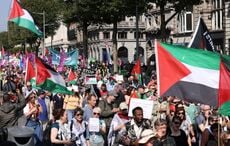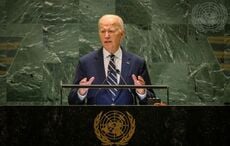Mahmoud Bazzi, the man accused of kidnapping, torturing and killing Irish UN soldiers Thomas Barrett and Derek Smallhorne in Lebanon 1980, has been arrested in Michigan for immigration violations after living in the US for decades.
Bazzi, 71, lives in the city of Dearborn and has made his living driving an ice cream truck.
Khaalid Walls, a spokesman for the Detroit office of U.S. Immigration and Customs Enforcement, told Jim Schaefer of the Detroit Free Press that Bazzi was arrested at his home without incident yesterday morning on charges of entering the US with falsified papers.
His deportation hearing is set to take place next week. At this time, the questions of where Bazzi would be deported to and whether he will face additional charges for the murders of the two Irish soldiers remain unanswered.
He is also accused of shooting and injuring a third Irish UN soldier, John O’Mahony, who survived the 1980 attack.
Family, friends and comrades of the soldiers have been campaigning for justice for over three decades.
In recent months, they formally organized and redoubled their efforts, writing to officials in the US and Ireland and holding peaceful demonstrations. The most recent vigil, held on July 5, saw a few hundred former UN soldiers gather outside the US Embassy in Dublin.
“Finally, after 34 years, the sacrifice of our murdered comrades may be recognized,” Robbie Masterson, spokesperson of the group “Justice for Smallhorne and Barrett” and a veteran of the Irish army, told IrishCentral. “This man may now face justice for the abduction, attempted murder, torture and murder of Irish United Nations Peacekeepers in South Lebanon in 1980."
On April 18, 1980, Private Barrett and Private Smallhorne, two young Irish soldiers stationed with the United Nations Interim Forced in southern Lebanon (UNIFIL), were kidnapped, tortured and executed. A third Irish soldier, O’Mahony, shot five times in the legs and back, survived.
The killings were said to be an act of revenge for the death of a fighter with the South Lebanon Army (SLA) who had perished two weeks earlier during a clash between SLA troops and UNIFIL soldiers from Ireland and the Netherlands.
The three Irish soldiers were part of a convoy taking supplies to posts along the contested Israeli-Lebanon border. With them were two unarmed officers from UN Observer Group Lebanon – Major Harry Klein, an American, and Captain Patrick Vincent, a Frenchman – and two members of the Associated Press – American journalist Steve Hindy (better known today as the founder of Brooklyn Brewery) and Armenian-Lebanese photographer Zaven Vartan.
The convoy was ambushed and held in a deserted schoolhouse. Shortly after Barrett, Smallhorne and O’Mahony were separated from the group, one of their captors opened fire. As O’Mahony recalled in a previous interview with IrishCentral, he was hit, but his comrades were able to flee the building. They were apprehended outside and driven away by one of the gunmen.
The rest of the convoy was released. The bodies of Barrett and Smallhorne were found later that day. They had visibly been tortured and then executed, one shot in the back of the head, the other in the front of his neck.
The following week, a man named Mahmoud Bazzi, recognizable to the survivors of the ambush as the man who drove off with Barrett and Smallhorne, appeared on Lebanese TV taking credit for the killings and avenging the death of his brother.
A documentary aired by RTE in 2000 to mark the 20th anniversary of the killings tracked down Bazzi and found him living in Dearborn, driving an ice cream truck. Doorstepped by the lead journalist on the project, Bazzi denied any involvement in the killings, saying an SLA commander had threatened to kill his family if he did not take credit.
In interviews with the Detroit Free Press in recent weeks, Bazzi admitted that he was present for the abduction, but still maintained that he was not responsible for the torture and murder of Barrett and Smallhorne.
Exactly when and how Bazzi gained entry to the US is still unknown, though he is believed to have lived in Dearborn for at least 21 years.
How long he has been on the radar of US Immigration and Customs Enforcement is also unclear.
Both Hindy and O’Mahony say they have been contacted by ICE and Homeland Security multiple times over the years – most recently in June of 2013, when Hindy was visited by two agents who informed him that Bazzi had begun proceedings to obtain US citizenship.
As of last month, a spokesperson for the Detroit Office of ICE told the Free Press he couldn’t confirm nor deny immigration authorities were investigating Bazzi. The announcement of his arrest marks the first time ICE has publicly commented.
"I'm pleased that the US authorities are finally holding Bazzi accountable for this awful crime," Hindy told IrishCentral following the news of his arrest.
Ireland and the US have a bilateral extradition treaty, but the fact that Bazzi is not a US citizen makes it unlikely he will be extradited to Ireland. There is no extradition agreement between Ireland and his home country of Lebanon.




Comments